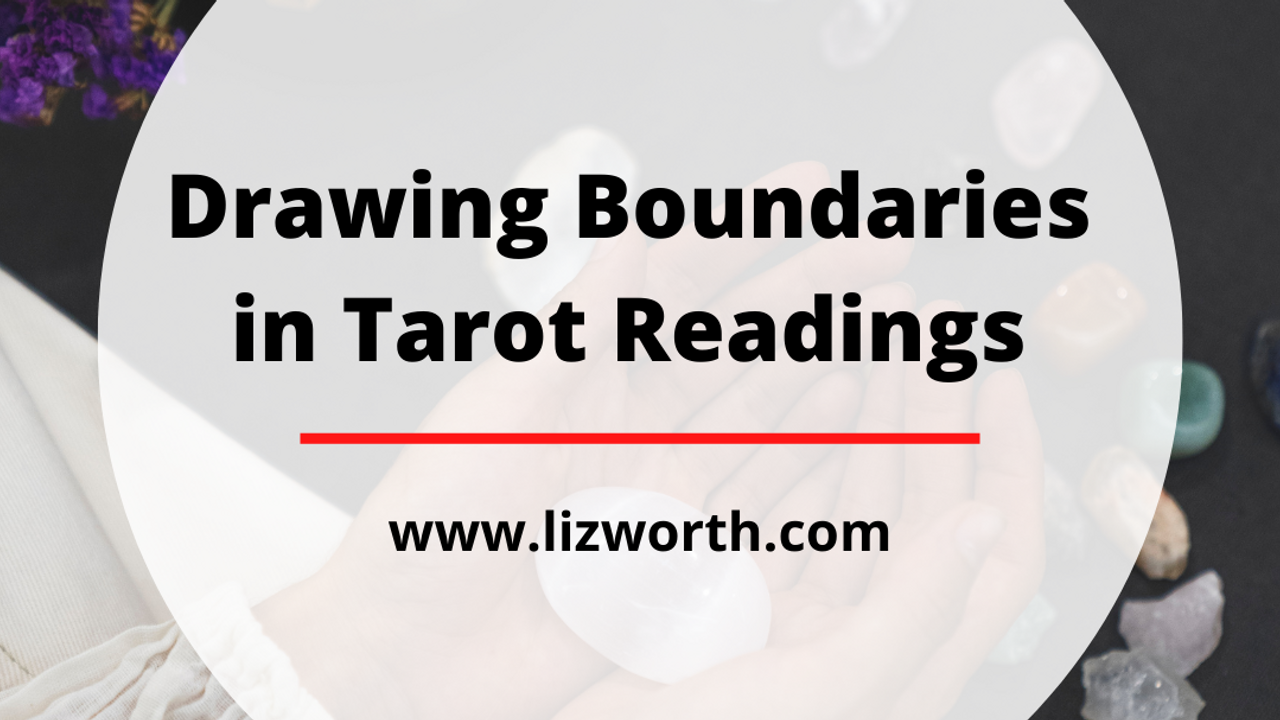Drawing Boundaries in Tarot Readings

I get a lot of questions about how to prepare for tarot readings from a reader’s perspective.
Readers are often concerned with protecting their energy by staying grounded. Or by shielding against a draining querent.
Boundaries in tarot readings go both ways, though, and it’s important to remember that our querents have boundaries, too.
But we might not always know what those boundaries are for each querent. Every individual will have a different comfort zone. And not all querents will be experienced with readings enough to know what they want from the experience.
People often come to tarot readings with an open mind. But that doesn’t necessarily mean that anything goes in a tarot reading.
Establishing some boundaries for your own conduct can go a long way in ensuring that querents have a great experience with you.
Here are a few boundaries I’m mindful of that you might find helpful, too.
Honesty and respect can co-exist.
Some tarot readers like to “tell it like it is,” which is a great aim if it means keeping the reading honest, rather than placating to what a querent wants to hear.
But it shouldn’t mean that sensitivity, compassion, or respect go out the window.
You can deliver a clear, authentic reading without hurting someone’s feelings with a rough delivery.
Listen to your querent.
If you’re doing a live, one-on-one reading (as opposed to an email or pre-recorded reading), there a lot of ways you can listen to your querent.
Sometimes people will openly tell you they’re not ready to hear certain messages. Be mindful of this: If someone is clearly telling you they’re not mentally or emotionally prepared for something, don’t force the issue.
If a querent decides they don’t want to go too far into a certain topic, that’s okay. Change direction as appropriate and let the reading continue from there.
One-on-one readings provide opportunities to listen in other ways, too. Changes in body language, facial expressions, and tone of voice are also things you can tune into. If you’re sensing someone is getting uncomfortable, check in and ask if they want you to continue before pushing on with the reading.
Be careful with messages that aren’t relevant.
If you’ve studied with me before, you’ll have heard me talk about the importance of staying on card and sticking clearly to questions or card positions.
There can be a tendency to meander and wander when reading tarot. But there’s a fine line between delivering a flowing reading that feels like a channelled stream of consciousness, versus a reading that is a mish mash of the reader’s random, personal thoughts or opinions.
If you find yourself starting to ramble, or you feel like you’re forcing answers or insights just to fill the time, stop. Take a breath, take a pause, and check in with the querent to see where they would like to go next.
Staying relevant with the information you’re offering in a reading can be important. Sometimes, querents might have a list of questions they’re hoping to cover and don’t want the time eaten up with details they’re not concerned with.
In other instances, messages that feel irrelevant or uninvited can feel intrusive and disconnected to the querent.
Define the lines between spying and prying.
Sometimes, querents will be the ones to cross a boundary without knowing it.
Over the years, I’ve had a number of clients sit down to ask all kinds of questions about everyone else but themselves. They wanted to know if their kids would be successful in their careers. Or whether a family member’s health would improve. Or if an adult child’s marriage would last.
It's typical for querents to ask about relationships they are in, but usually, it’s within the bounds of mending, improving, or deepening those relationships. In those cases, the querent is directly involved in those questions. They are playing a key role.
But when querents ask about aspects of other people’s lives that they have little to no involvement in? That starts to feel like spying or prying to me.
When I’ve had questions about whether a family member will succeed in their career, or whether someone else’s marriage is okay, or whatever it may be… I start to wonder: “Why aren’t those people sitting here asking me these questions instead?”
Because those individuals should really be the ones sitting down for a reading if I’m looking at their careers, relationships, or states of being.
And the querent who is present should be asking about their own life instead by focusing on questions about their careers, relationships, or other concerns.
I don’t want to be a messenger or middle person, and I also don’t want to say something that is going to end up causing a rift in someone’s existing relationships.
How would you feel if a family member called you up and said they asked their local tarot reader about your job or marriage? Personally, I would feel uncomfortable with that, and would rather get a reading myself if there was something I wanted to know.
So I work by that rule: If it would make me uncomfortable, it will probably make someone else uncomfortable, too.
What are some boundaries you have when it comes to reading for other people?
Until next time,
Liz
p.s. If you’re looking for help building your client base or establishing your tarot practice this year, I offer mentorship sessions for emerging and established tarot professionals. Learn more here.
